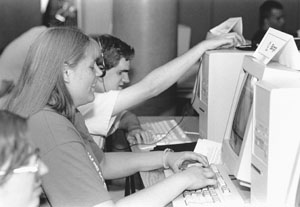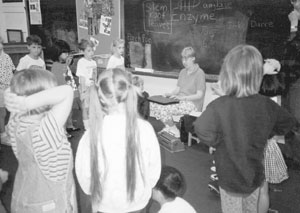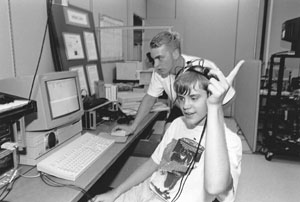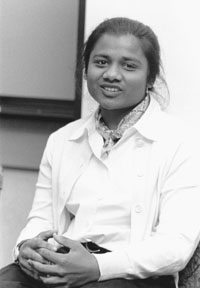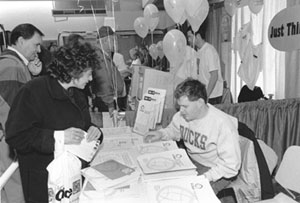Director's Digressions
Welcome '98 Scholars!
Here we go again! Live from the University of Washington in Seattle, the sixth annual summer study program for high school students from across the United States! We're sad to report that, unless a funding source is located, this session will be the last group of students from around the country, but happy to report that Washington will continue to support Scholars in that state. This summer's national DO-IT Scholars have much in common-they share a passion for science, engineering, mathematics, and technology, and for pursuing college and a career. I'll introduce you to some of the '98 Scholars below and introduce the rest of them in our next issue of DO-IT News.
Emily hails from Florida. Describing herself as "a very curious person," she is interested in biology and computer science. Emily, who has cerebral palsy, looks forward to learning more about how technology can help her academically and personally.
Kimberlee comes from a long line of educators; both her mom and grandparents were teachers. She enjoys math but science is her favorite subject. She hopes to apply her interests in the field of computers. She likes to work with children and already helps other students with disabilities at school. Kimberlee has cerebral palsy and looks forward to meeting others who have disabilities through DO-IT.
Shavonne is fascinated by the interrelation between science and mathematics and plans to apply her interests in the field of environmental science as an undergraduate followed by an advanced degree in environmental law. Shavonne, who has a visual impairment, looks forward to traveling from her home state of Louisiana this summer to meet other high school students with disabilities who have similar interests.
Dustin currently lives in Indiana but has travel in his future. After high school he hopes to attend the University of Cincinnati for two years, transfer to the University of Hawaii to complete a Bachelors degree in marine sciences, and then move to Alaska to work as a marine biologist. Eventually, he'd like to return to a job at the Cincinnati Zoo. Dustin has a learning disability and wants to learn how others overcome similar challenges.
Amy of Minnesota, learned about DO-IT through conversations with one of our veteran Ambassadors at Camp Courage. Amy, who has cerebral palsy, includes the study of plant life as one of her special interests. She "cares very much about (her) education" and looks forward to meeting fellow Scholars.
Maggie, from Florida, has set her goals sky-high with plans to major in aerospace engineering and land a job with NASA or a technical engineering company. Maggie has a learning disability and looks forward to sharing ideas with other students who have met challenges imposed by disabilities.
Brian, from sunny California, professes a love for mathematics and "wonders how mathematics came into existence." Brian, who has cerebral palsy, uses a computer to complete all of his homework and get online. He hopes to eventually build a career in computer engineering, happily noting that this field includes plenty of math!
Landon, from Washington, has a mobility impairment which doesn't stop his "full speed ahead" attitude. Landon, another math whiz, hopes one day to become a CPA. He looks forward to being away from home and at the UW to get a jump on his career and life.
Nick, our first Scholar from Indiana, is another "natural" in mathematics and hopes to become either an elementary school math teacher or an engineer. Nick, who has a visual impairment, thinks meeting new people is a good thing because "it shows your true side when you get to know someone for the first time."
David joins us from Oregon and proclaims his interest in "what is going on in my world." He enjoys chemistry, physics, and technology and does well in math and writing. Visually impaired, David has had limited opportunities to interact with other students with disabilities and is excited to meet DO-IT Scholars, Ambassadors, and Mentors.
Jeffrey resides in Kansas and has always enjoyed "anything having to do with science." With special interests in geology and paleontology, Jeffrey likes interacting with others who like science and math, disabled or not. He thinks it will be especially interesting to meet others who face challenges similar to those he has faced as a person with a motor impairment.
David lives in Alaska and enjoys science labs, including dissection and "taking things apart to understand how they work." Wildlife studies is a particularly interesting subject area to him. David has quadriplegia and looks forward to learning more about science, engineering, and math and meeting professionals with disabilities in these fields.
Wesley joins us from Nebraska. Though his major is undecided, he plans to attend a four-year college and build on his current interests in computer science, mathematics, and broadcasting. Wesley is blind and uses nifty technology to get his homework done; this includes Braille writers, talking calculators, computers, and a Braille 'n Speak.
Jessica enjoys biochemistry and cell biology in her home state of New Mexico. Facing the challenges of dyslexia herself, she hopes to someday help others with learning disabilities after she completes a degree in psychology or psychiatry. She thinks DO-IT will give her a good feel for college life and knowledge of computers.
Jessie is working hard in school so he can attend a college or university. Washington is his home. Jessie, who has cerebral palsy, thinks he might one day pursue a career in space sciences. He looks forward to getting a trial run at college life through DO-IT and meeting other Scholars.
Justin, from New York, plans to attend the University of Colorado where he will study sociology. He hopes to become a rehabilitation counselor to help others develop leadership skills. Justin, who has cerebral palsy, looks forward to learning more about computers through DO-IT and sharing perspectives with other students who have disabilities.
Isiah, from Oregon, believes "both math and science drive life as we know it" and describes DO-IT as an "academic gold mine." Isiah has a mobility impairment and uses a computer to complete his school work and take tests. He plans to have a career as a writer, journalist, or teacher. He looks forward to relating to other DO-IT Scholars at Summer Study.
Ivan, of Maryland, has excelled in biology, chemistry, and physics at the honors level. Ivan, who has cerebral palsy, is excited to learn more about college and computers to help him prepare for his future. He's also excited by the possibility of catching a Mariners game during his stay in Seattle this summer.
John has plans to enter the field of dentistry, however, his immediate goals are to do well in school and improve his study habits. John is deaf and, like his Phase I cohorts, is enthusiastic about meeting others with disabilities. John is from Montana.
Welcome to all these new Scholars! We'll meet you in person this summer at the University of Washington. We'll "meet" more often via e-mail on the Internet.
To let new Scholars and others gain insight into the content and tone of our active discussions, this issue of DO-IT News features several recent on-line interactions. Check out the articles titled Listen to DO-IT; In DO-IT, FM Means "Funny Moment"; and DO-IT Goes to Work for just a taste of the diversity in topics and opinions our electronic community offers. Comments are direct quotes with minor editing for spelling, grammar, and clarity.
